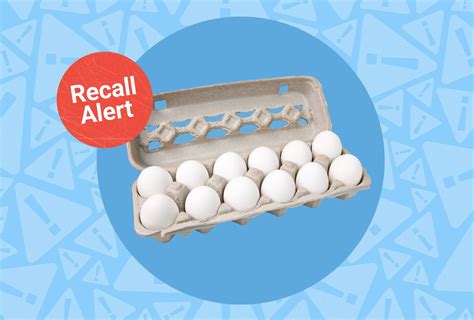
Millions of eggs sold at major retailers including Safeway, Walmart, and Kroger are being recalled due to potential Salmonella contamination, prompting a nationwide health alert and urgent warnings for consumers to check their egg cartons.
Approximately 206,749,248 eggs distributed across multiple states are subject to the voluntary recall by Rose Acre Farms of Hyde County, North Carolina. The eggs were sold under various brand names and store brands, heightening the risk that consumers may unknowingly possess contaminated products. The Food and Drug Administration (FDA) has issued detailed guidance to help consumers identify affected eggs and prevent illness.
The potentially contaminated eggs were distributed in the following states: Colorado, Florida, New Jersey, New York, North Carolina, Pennsylvania, Virginia, West Virginia, North Carolina, South Carolina, and also included eggs distributed to retail establishments and restaurants across the nation.
Rose Acre Farms initiated the recall after testing by the FDA revealed the presence of Salmonella Braenderup, a bacterium that can cause serious foodborne illness. “Consumers who have purchased eggs are urged to check the product codes printed on the cartons,” stated an FDA spokesperson. The product codes to look for are plant number P-1065, with dates ranging from January 11, 2024, to March 11, 2024.
Salmonella Concerns and Symptoms
Salmonella is a group of bacteria that can cause diarrheal illness in humans. It is one of the most common causes of food poisoning in the United States, with symptoms typically appearing 6 hours to 6 days after infection. These symptoms can include diarrhea, fever, abdominal cramps, and vomiting. Most people recover within 4 to 7 days without medical treatment, but in some cases, the illness can be severe and require hospitalization.
Young children, the elderly, and individuals with weakened immune systems are at higher risk of developing severe illness from Salmonella. In rare cases, Salmonella infection can spread from the intestines to the bloodstream and other parts of the body, leading to serious complications such as endocarditis, arthritis, and even death.
The FDA emphasizes that consumers should handle eggs carefully to prevent the spread of Salmonella. “Eggs should be cooked thoroughly to kill any bacteria that may be present,” the agency advises. It is also important to wash hands and surfaces thoroughly after handling raw eggs.
Details of the Recall
The recall includes a wide range of egg products sold under various brand names and store brands, including Great Value (Walmart), Member’s Mark (Sam’s Club), and Kroger brand eggs. The affected eggs were packaged in various sizes, from cartons of six to larger packages of 30 eggs. A full list of affected product codes and brands is available on the FDA website.
Rose Acre Farms is working with retailers to remove the recalled eggs from store shelves. Consumers who have purchased affected eggs are advised to discard them immediately or return them to the store for a full refund. “Consumers should not consume the recalled eggs,” the FDA warns.
The company has also established a toll-free hotline for consumers who have questions about the recall. The hotline can be reached at 1-855-546-0681.
Impact on Retailers and Consumers
The egg recall is expected to have a significant impact on retailers and consumers. Stores that sell affected eggs will need to remove them from their shelves and notify customers about the recall. Consumers who have purchased recalled eggs may experience inconvenience and concern about potential illness.
The recall also raises questions about the safety of the egg supply in the United States. The FDA is working to investigate the source of the contamination and prevent future outbreaks. “We are committed to ensuring the safety of the food supply,” said the FDA spokesperson. “We will continue to work with industry and our state partners to prevent foodborne illness.”
Preventative Measures and Future Actions
To prevent future Salmonella outbreaks, the FDA recommends that egg producers implement comprehensive food safety plans that include measures to control Salmonella contamination. These measures can include regular testing of eggs and the environment, proper sanitation practices, and employee training.
The agency also encourages consumers to take steps to protect themselves from Salmonella infection, such as cooking eggs thoroughly, washing hands and surfaces after handling raw eggs, and avoiding the consumption of raw or undercooked eggs.
Background on Rose Acre Farms
Rose Acre Farms is one of the largest egg producers in the United States, with operations in multiple states. The company has a history of food safety violations, including a 2018 Salmonella outbreak that was linked to eggs produced at its Hyde County, North Carolina, facility.
In that case, more than 40 people were sickened in 11 states, leading to a recall of more than 200 million eggs. The FDA subsequently issued a warning letter to Rose Acre Farms, citing several violations of food safety regulations.
The current recall raises concerns about the company’s ability to prevent Salmonella contamination. The FDA is closely monitoring the situation and will take appropriate action to ensure that Rose Acre Farms complies with food safety regulations.
Statements from Involved Parties
The FDA released an official statement urging consumers to take the recall seriously. “The FDA is advising consumers to check their egg cartons for the plant number P-1065 and dates ranging from January 11, 2024, to March 11, 2024. If you have these eggs, discard them immediately or return them to the store for a full refund. Do not consume them.”
Rose Acre Farms has issued its own statement, expressing regret for the inconvenience caused by the recall. “We are committed to providing safe, high-quality eggs to our customers,” the company said. “We are working closely with the FDA to investigate the source of the contamination and prevent future outbreaks. We will continue to update the public as more information becomes available.”
Retailers such as Walmart and Kroger have also issued statements, assuring customers that they are taking steps to remove recalled eggs from their shelves and notify customers about the recall.
Consumer Advice and Recommendations
Given the widespread nature of the recall, consumers are advised to take the following steps:
- Check egg cartons: Carefully inspect egg cartons for the plant number P-1065 and dates ranging from January 11, 2024, to March 11, 2024.
- Discard or return recalled eggs: If you have purchased recalled eggs, discard them immediately or return them to the store for a full refund. Do not consume them.
- Wash hands and surfaces: Wash hands and surfaces thoroughly after handling raw eggs.
- Cook eggs thoroughly: Cook eggs thoroughly to kill any bacteria that may be present.
- Monitor for symptoms: If you experience symptoms of Salmonella infection, such as diarrhea, fever, abdominal cramps, and vomiting, seek medical attention.
- Contact the company: Contact Rose Acre Farms at 1-855-546-0681 if you have questions about the recall.
- Stay informed: Stay informed about the recall by following updates from the FDA and other reliable sources.
Economic Implications
The egg recall will have economic implications for egg producers, retailers, and consumers. Egg producers will incur costs associated with the recall, such as the cost of removing recalled eggs from store shelves and providing refunds to customers. Retailers may experience a decline in egg sales as consumers become wary of purchasing eggs. Consumers may face higher egg prices as the supply of eggs decreases.
The full economic impact of the recall will depend on the extent of the contamination and the duration of the recall. However, it is clear that the recall will have a significant impact on the egg industry and consumers.
Historical Context of Egg-Related Recalls
Egg-related recalls due to Salmonella contamination are not uncommon in the United States. In 2010, a massive egg recall affected approximately 500 million eggs and was linked to a Salmonella Enteritidis outbreak that sickened more than 1,900 people. The outbreak was traced to two Iowa egg farms, Wright County Egg and Hillandale Farms, which were found to have unsanitary conditions and inadequate food safety controls.
The 2010 recall led to increased scrutiny of egg production practices and stricter food safety regulations. The FDA subsequently implemented the Egg Safety Rule, which requires egg producers to implement measures to prevent Salmonella contamination.
Despite these efforts, egg-related recalls continue to occur, highlighting the challenges of preventing Salmonella contamination in the egg supply. The current recall underscores the importance of ongoing vigilance and continuous improvement in food safety practices.
The Role of Regulatory Agencies
The FDA plays a critical role in regulating the safety of the food supply, including eggs. The agency is responsible for inspecting egg production facilities, testing eggs for Salmonella, and enforcing food safety regulations.
The FDA also works with state and local health agencies to investigate outbreaks of foodborne illness and identify the source of contamination. In the case of the current egg recall, the FDA is working closely with Rose Acre Farms and retailers to remove recalled eggs from store shelves and notify consumers about the recall.
The FDA’s efforts are essential for protecting public health and preventing foodborne illness. However, the agency faces challenges in keeping pace with the evolving food industry and the increasing complexity of the food supply chain.
Impact on Food Safety Regulations
Each recall and outbreak puts a new degree of pressure and consideration on food safety regulations. The current outbreak is no different. The FDA uses the information gathered in each incident to improve the effectiveness of current regulations as well as create new preventative measures. Preventative measures, such as the Egg Safety Rule established after the 2010 outbreak, can create a safer food supply for consumers and minimize the chances of foodborne illnesses.
Long-Term Effects on Consumer Confidence
Salmonella outbreaks and recalls can erode consumer confidence in the safety of the food supply. When consumers lose trust in the safety of the food they eat, they may be more likely to avoid certain foods or brands, which can have a negative impact on the food industry.
Restoring consumer confidence requires transparency, accountability, and a commitment to food safety. Food producers must be proactive in implementing food safety measures and communicating with consumers about their efforts. Regulatory agencies must be vigilant in enforcing food safety regulations and holding food producers accountable for violations.
The Future of Egg Production and Safety
The egg industry is constantly evolving, with new technologies and production methods being developed. These changes can bring benefits, such as increased efficiency and reduced costs, but they can also pose new challenges to food safety.
The future of egg production and safety will depend on the industry’s ability to adapt to these changes and implement effective food safety measures. This will require ongoing investment in research, technology, and training, as well as a commitment to collaboration between food producers, regulatory agencies, and consumers.
Expanding on the Salmonella Braenderup Strain
The specific strain of Salmonella identified in this recall is Salmonella Braenderup. While all Salmonella bacteria share common characteristics, different strains can have varying levels of virulence and antibiotic resistance. Understanding the specific strain involved in an outbreak is crucial for public health officials in tracing the source of the contamination and implementing appropriate control measures.
Salmonella Braenderup, like other Salmonella strains, causes illness through the consumption of contaminated food or water. The bacteria infect the intestinal tract, leading to inflammation and the characteristic symptoms of salmonellosis.
Detailed List of Brands Affected
The recall includes eggs sold under a variety of brand names. While the initial reports focused on Great Value, Member’s Mark, and Kroger, a more comprehensive list of potentially affected brands includes:
- Great Value (Walmart)
- Member’s Mark (Sam’s Club)
- Kroger
- Food Lion
- Cracker Barrel
- Crystal Farms
- Sunshine Farms
- These brand names might be distributed over more than one area, so care should be taken to check the specific plant code and date range.
Consumers are advised to check the FDA website for the most up-to-date list of affected brands and product codes.
The Importance of Proper Egg Handling and Cooking
Even if eggs are not subject to recall, it is important to handle and cook them properly to prevent Salmonella infection. The FDA recommends the following guidelines:
- Purchase eggs only from reputable sources: Buy eggs from stores or farmers markets that handle eggs properly.
- Refrigerate eggs promptly: Refrigerate eggs as soon as possible after purchase.
- Store eggs in their original carton: Store eggs in their original carton in the coldest part of the refrigerator.
- Cook eggs thoroughly: Cook eggs until the yolk and white are firm. Use a food thermometer to ensure that eggs reach an internal temperature of 160°F (71°C).
- Avoid raw or undercooked eggs: Avoid eating raw or undercooked eggs, such as in homemade mayonnaise, Caesar salad dressing, or hollandaise sauce.
- Wash hands and surfaces: Wash hands and surfaces thoroughly after handling raw eggs.
Egg Alternatives and Dietary Considerations
For individuals who are concerned about Salmonella contamination or who have dietary restrictions, there are several egg alternatives available. These include:
- Egg substitutes: Egg substitutes are made from egg whites, soy protein, or other ingredients. They can be used in place of eggs in many recipes.
- Flaxseed meal: Flaxseed meal can be used as an egg replacer in baking. Mix 1 tablespoon of flaxseed meal with 3 tablespoons of water and let it sit for 5 minutes before adding it to the recipe.
- Chia seeds: Chia seeds can also be used as an egg replacer in baking. Mix 1 tablespoon of chia seeds with 3 tablespoons of water and let it sit for 5 minutes before adding it to the recipe.
- Mashed bananas: Mashed bananas can be used as an egg replacer in some recipes, such as muffins and pancakes.
FAQ Section
Q1: How do I know if the eggs I purchased are part of the recall?
A1: Check the egg carton for the plant number P-1065 and dates ranging from January 11, 2024, to March 11, 2024. These dates are printed on the side of the carton. Also, check for brands such as Great Value, Member’s Mark, Kroger, Food Lion, Cracker Barrel, Crystal Farms, and Sunshine Farms. The most reliable method to ensure if your purchased eggs are impacted is to visit the FDA website and match the UPC codes to the product you purchased.
Q2: What should I do if I have purchased recalled eggs?
A2: The FDA advises you to discard the eggs immediately or return them to the store where you purchased them for a full refund. Do not consume them under any circumstances.
Q3: What are the symptoms of Salmonella infection, and when do they usually appear?
A3: Symptoms of Salmonella infection typically include diarrhea, fever, abdominal cramps, and vomiting. These symptoms usually appear 6 hours to 6 days after consuming contaminated food. Most people recover within 4 to 7 days without medical treatment.
Q4: Who is most at risk of severe illness from Salmonella?
A4: Young children, the elderly, and individuals with weakened immune systems are at higher risk of developing severe illness from Salmonella. In rare cases, Salmonella infection can spread from the intestines to the bloodstream and other parts of the body, leading to serious complications.
Q5: How can I prevent Salmonella infection from eggs in the future?
A5: To prevent Salmonella infection, handle and cook eggs properly. Always refrigerate eggs promptly, cook them thoroughly until the yolk and white are firm (internal temperature of 160°F/71°C), avoid eating raw or undercooked eggs, and wash hands and surfaces thoroughly after handling raw eggs. Also, purchase eggs only from reputable sources and make sure to store them in their original carton in the coldest part of the refrigerator.









